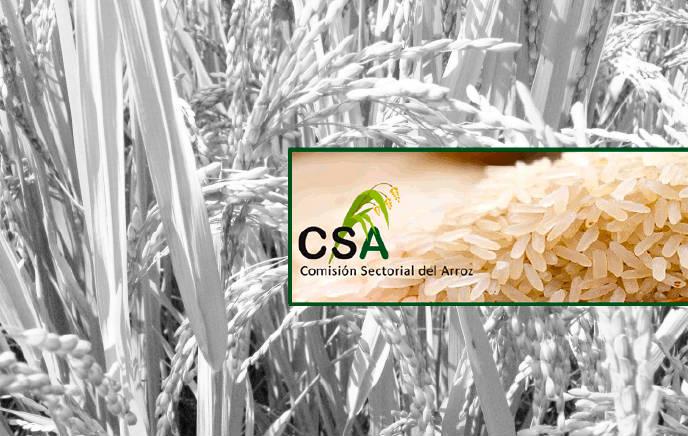La Comisión Sectorial del Arroz CSA adquirió la herramienta APIA-BPM para la gestión de diversos procesos institucionales.
Resumen:
El 1 de diciembre de 2013, la CSA estrenó un Sistema Web que le otorgó un importante fortalecimiento institucional y la modernización de sus servicios, gracias al "mostrador virtual" proporcionado por STATUM.
Información:
El uso de la plataforma APIA-BPM ha permitido al organismo la concreción de procesos muy variados: en la actualidad es capaz de gestionar trámites, habilitar la gestión de usuarios acreditados para remitir información, mientras que los productores pueden ingresar datos de su rubro al igual que los molinos y los exportadores de granos.
Asimismo, el público interesado tiene la posibilidad de consultar el estado de los trámites, contando además con la gestión de licencias automáticas de exportación (autorizadas por el Ministerio de Economía y Finanzas), ahora capaces de enviarse de forma electrónica.
La plataforma fue gestionada por la Oficina de Planeamiento y Presupuesto (OPP), brindándoles a los funcionarios la facultad de iniciar sus trámites desde la Web al completar un formulario con nombre de usuario y contraseña, para la cual debieron naturalmente registrarse como usuarios del sistema. Este registro es de vital importancia para la tramitación y posterior utilización de la información suministrada, a partir de la declaración jurada que realizan las empresas arroceras -incluyendo productores, molinos e intermediarios- con fines probatorios.
El instrumento "formulario" mencionado en el párrafo anterior, corresponde a lo establecido por el Decreto 500/98, el cual facilita la gestión de forma electrónica de las declaraciones juradas, las licencias de exportación y toda la documentación vinculada a estos trámites.
Adicionalmente, la información contenida en los formularios permite obtener datos estadísticos de forma automática para la CSA y su Subcomisión Estadística, como también para los propios exportadores, el Ministerio de Ganadería, Agricultura y Pesca y el Ministerio de Economía y Finanzas.
La aplicación se comunica mediante la Plataforma de Gobierno Electrónico con la Dirección Nacional de Aduanas y la Dirección General Impositiva.
2) Se redujeron los tiempos de espera. Esta ventaja interna en la organización también se trasladó a la contraparte: los receptores de los servicios. Por ejemplo, las audiencias que se entregaban para dentro de dos meses, pasaron para dentro de dos semanas; sumado a la reducción del tiempo como consecuencia de una mayor eficiencia en la gestión de las funciones de la DINATRA.
3) Se evidenció un importante ahorro económico como resultado de la disminución de errores, contrayéndose los gastos en el correo, pasajes (si la persona debía concurrir en varias oportunidades a la institución), entre otros.
4) Los ciudadanos obtuvieron una atención más personalizada a sus reclamaciones, de modo que comenzaron a recibir un trato más igualitario con procesos establecidos en la resolución de conflictos. Por consiguiente, las mejoras significativas internas a la institución, se trasladaron a los servicios prestados a la población y por ende, influyendo positivamente en los grupos sociales intervinientes en las organizaciones comprometidas con el trabajo en nuestro país.
Solución
La Oficina de Planeamiento y Presupuesto (OPP) optó por la solución de APIA-BPM de STATUM para implementarla en la DINATRA. Fue adquirida mediante AGESIC y contó con la propia financiación de la OPP que abarcó el software, los costos de capacitación, la realización de manuales de procedimientos y en algunos casos el hardware. La DINATRA invirtió en la compra del hardware y en las horas de trabajo para los funcionarios dentro de la capacitación. Se conformaron equipos multidisciplinarios constituidos por miembros partícipes del proyecto, la OPP y el MTSS, a los efectos de intervenir en las áreas de gestión, de comunicaciones y de tecnología, junto con un Comité de Seguimiento.
La parte informática se comenzó a implementar culminando el mes de noviembre de 2009, en el área de Consultas. En febrero de 2010, se implementó en los procesos de Audiencias. Actualmente, se encuentra implementado en ambos sectores.
Para poder añadir las tecnologías al trabajo de la DINATRA, se instaló primeramente un Call Center con el propósito de atender las preguntas más urgentes, dar números, resolver consultas y trámites telefónicos. Su instalación se realizó de modo que fuera posible adquirir experiencia con el software previo a la implementación de APIA-BPM en Consultas y Audiencias. Posteriormente, se realizó un plan piloto en dependencias del MTSS menos centralistas como son los casos de Belvedere, Atlántida
y Piriápolis.
Finalmente, se automatizaron 10 procesos y al igual que la DINACOIN (Dirección Nacional de Coordinación en el Interior) abarcó el pago de multas por incomparecencia, el seguimiento vía electrónica de trámites urgentes, consultas laborales, el registro de delegados sindicales, vendedores de plaza y viajantes, administradores de edificios y convenios colectivos.
APIA-BPM permitió integrar entre sí todas sus aplicaciones de forma que no hubo que adaptar una por una, ya que todas ellas se adecuaron a la nueva definición del proceso. La implementación del software ofreció una solución óptima al Estado, como agente prestador de servicios. Ha sido un factor primordial para el desarrollo del gobierno electrónico en nuestro país, eliminando la rigidez de las estructuras institucionales y acercando a la ciudadanía a los organismos que resuelven sus demandas.
El 1 de diciembre de 2013, la CSA estrenó un Sistema Web que le otorgó un importante fortalecimiento institucional y la modernización de sus servicios, gracias al "mostrador virtual" proporcionado por STATUM.
Información:
El uso de la plataforma APIA-BPM ha permitido al organismo la concreción de procesos muy variados: en la actualidad es capaz de gestionar trámites, habilitar la gestión de usuarios acreditados para remitir información, mientras que los productores pueden ingresar datos de su rubro al igual que los molinos y los exportadores de granos.
Asimismo, el público interesado tiene la posibilidad de consultar el estado de los trámites, contando además con la gestión de licencias automáticas de exportación (autorizadas por el Ministerio de Economía y Finanzas), ahora capaces de enviarse de forma electrónica.
La plataforma fue gestionada por la Oficina de Planeamiento y Presupuesto (OPP), brindándoles a los funcionarios la facultad de iniciar sus trámites desde la Web al completar un formulario con nombre de usuario y contraseña, para la cual debieron naturalmente registrarse como usuarios del sistema. Este registro es de vital importancia para la tramitación y posterior utilización de la información suministrada, a partir de la declaración jurada que realizan las empresas arroceras -incluyendo productores, molinos e intermediarios- con fines probatorios.
El instrumento "formulario" mencionado en el párrafo anterior, corresponde a lo establecido por el Decreto 500/98, el cual facilita la gestión de forma electrónica de las declaraciones juradas, las licencias de exportación y toda la documentación vinculada a estos trámites.
Adicionalmente, la información contenida en los formularios permite obtener datos estadísticos de forma automática para la CSA y su Subcomisión Estadística, como también para los propios exportadores, el Ministerio de Ganadería, Agricultura y Pesca y el Ministerio de Economía y Finanzas.
La aplicación se comunica mediante la Plataforma de Gobierno Electrónico con la Dirección Nacional de Aduanas y la Dirección General Impositiva.
2) Se redujeron los tiempos de espera. Esta ventaja interna en la organización también se trasladó a la contraparte: los receptores de los servicios. Por ejemplo, las audiencias que se entregaban para dentro de dos meses, pasaron para dentro de dos semanas; sumado a la reducción del tiempo como consecuencia de una mayor eficiencia en la gestión de las funciones de la DINATRA.
3) Se evidenció un importante ahorro económico como resultado de la disminución de errores, contrayéndose los gastos en el correo, pasajes (si la persona debía concurrir en varias oportunidades a la institución), entre otros.
4) Los ciudadanos obtuvieron una atención más personalizada a sus reclamaciones, de modo que comenzaron a recibir un trato más igualitario con procesos establecidos en la resolución de conflictos. Por consiguiente, las mejoras significativas internas a la institución, se trasladaron a los servicios prestados a la población y por ende, influyendo positivamente en los grupos sociales intervinientes en las organizaciones comprometidas con el trabajo en nuestro país.
Solución
La Oficina de Planeamiento y Presupuesto (OPP) optó por la solución de APIA-BPM de STATUM para implementarla en la DINATRA. Fue adquirida mediante AGESIC y contó con la propia financiación de la OPP que abarcó el software, los costos de capacitación, la realización de manuales de procedimientos y en algunos casos el hardware. La DINATRA invirtió en la compra del hardware y en las horas de trabajo para los funcionarios dentro de la capacitación. Se conformaron equipos multidisciplinarios constituidos por miembros partícipes del proyecto, la OPP y el MTSS, a los efectos de intervenir en las áreas de gestión, de comunicaciones y de tecnología, junto con un Comité de Seguimiento.
La parte informática se comenzó a implementar culminando el mes de noviembre de 2009, en el área de Consultas. En febrero de 2010, se implementó en los procesos de Audiencias. Actualmente, se encuentra implementado en ambos sectores.
Para poder añadir las tecnologías al trabajo de la DINATRA, se instaló primeramente un Call Center con el propósito de atender las preguntas más urgentes, dar números, resolver consultas y trámites telefónicos. Su instalación se realizó de modo que fuera posible adquirir experiencia con el software previo a la implementación de APIA-BPM en Consultas y Audiencias. Posteriormente, se realizó un plan piloto en dependencias del MTSS menos centralistas como son los casos de Belvedere, Atlántida
y Piriápolis.
Finalmente, se automatizaron 10 procesos y al igual que la DINACOIN (Dirección Nacional de Coordinación en el Interior) abarcó el pago de multas por incomparecencia, el seguimiento vía electrónica de trámites urgentes, consultas laborales, el registro de delegados sindicales, vendedores de plaza y viajantes, administradores de edificios y convenios colectivos.
APIA-BPM permitió integrar entre sí todas sus aplicaciones de forma que no hubo que adaptar una por una, ya que todas ellas se adecuaron a la nueva definición del proceso. La implementación del software ofreció una solución óptima al Estado, como agente prestador de servicios. Ha sido un factor primordial para el desarrollo del gobierno electrónico en nuestro país, eliminando la rigidez de las estructuras institucionales y acercando a la ciudadanía a los organismos que resuelven sus demandas.





Comentarios (0)
Deja un comentario